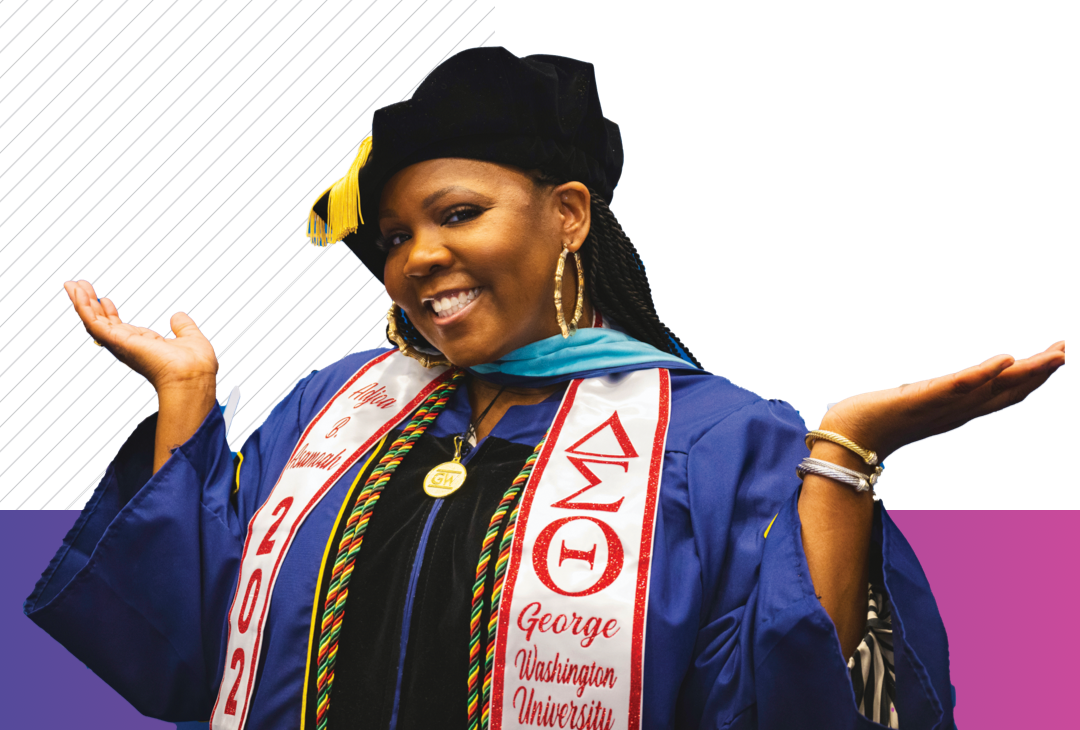Advancing the Narrative
Advancing the narrative
Adjoa B. Asamoah champions issues of the Black community, one step at a time.
by Caite Hamilton

Adjoa B. Asamoah has been making what American civil rights leader John Lewis called “good trouble” her whole life. She attended her first rally at 2, started taking college classes in Africana studies at 5 (thanks to her father, then a university professor at New Hampshire College), and by 9 was, as she puts it, “full-blown organizing.”
“I was sort of born into … the fight for civil rights and Black liberation,” Asamoah, Ed.D. ‘24, says. Her mother grew up in North Carolina during the Jim and Jane Crow era; her father was born under British colonization in what would become the Republic of Ghana. “I was born into the movement, which is to work to advance the human condition, but also specifically acknowledging the racial inequities and disparities and the need to be specific about making sure that Black people have their rights.”
She stirred up good trouble while getting her secondary education at Hopkins School, first by testifying at the Connecticut state capitol to change public bus routes, then by lobbying the head of school to change the language of “headmaster” to something less loaded. She stirred up good trouble while at Temple University when she protested against the university’s plan that would likely displace residents between its main and health science campuses as the university attempted to connect the two sites à la Georgetown University. She stirred up good trouble as the founding director of one of only two Black-owned mental health agencies in Philadelphia, advocating for students who had been misdiagnosed with behavioral issues.
In each case, her efforts were, if not rewarded, at least recognized as a step forward in the fight for racial equity. And each of those recognitions—National Advisor for Black Engagement with the 2020 Biden-Harris campaign; Black Engagement Director for the 59th Presidential Inaugural Committee; president of the Black student union at Hopkins; senior advisor for racial equity for the U.S. Department of Housing and Urban Development Secretary; president of her college chapter of her sorority, Delta Sigma Theta; treasurer for Temple’s African Student Union and vice president of its NAACP chapter; member of Temple’s Board of Visitors—have raised her platform to focus on the good trouble she’s getting into these days as the leader of the CROWN Act movement, a national alliance that works to enact policies outlawing race-based hair discrimination.
There’s a photo of Asamoah at age 9 visiting the site of Elmina Castle (“Some people call them castles, I call them dungeons,” she says) in Ghana, where from the 16th to 19th centuries enslaved people were held captive awaiting their forced migration to what would later become the United States. The spaces were cramped, and the people held there were chained together, forced to endure inhumane conditions.
In the photograph, Asamoah wears a purple skirt and shirt, braids in her hair, and she carries a pocketbook—a typical getup for a young child, but one that stood in very sharp contrast to what she was feeling at the time.
“I decided then that I wanted to spend my life working to improve the quality of life of my people,” she says. “I didn't have the words [as a 9-year-old] to describe what that would look like, but I knew I didn't like [what I was seeing].” Taking that trip, she says, ignited something within her.
“Adjoa's superpower is, undoubtedly, her passion,” says Julienne Joseph, a friend and chief of staff in the office of Secretary Marcia L. Fudge in the U.S. Department of Housing and Urban Development. “She is unapologetically Black and lives her work. While most people put on their respective ‘work hats’ from 9 to 5, Adjoa constantly advocates for the advancement and empowerment of our people and never passes on an opportunity to educate, inspire and encourage our community to think and do better.”
Asamoah attended progressive schools in her hometown of New Haven, Connecticut, including storied Hopkins School, followed by undergrad at Temple University, where she double-majored in African American studies and psychology.
“I wanted to understand how Black people were not just surviving but in some cases thriving, given our history in this country,” she says.
She also wanted to address the culture of silence around mental and behavioral health in the Black community, so she stayed to earn her master’s in educational psychology. Eventually, she became a sought-after advocate for Black and Brown kids whose schools had wrongly diagnosed them with behavioral issues.
That’s what brought her to the George Washington University.
Asamoah was a consultant conducting training sessions for the Philadelphia school district on unconscious bias when she realized she needed to take her advocacy to the federal level. She applied for GW’s doctoral program and, while working toward her degree, good trouble found her.
She was appointed as the senior advisor in the executive office of D.C. mayor Muriel Bowser and worked to codify the nation's first Office of African American Affairs, a feat that required her to gain the support of sorority and fraternity presidents, academics, activists, critics and clergy alike. Then, with her reputation as an organizer solidified and her ABA Consulting firm established, Asamoah started getting calls from national organizations needing her expertise. The first one? Emily’s List. Then came the Democratic National Committee, the Democratic Congressional Campaign Committee, Third Way, the National Democratic Redistricting Committee, the Congressional Black Caucus Institute.
“I admittedly became more focused on my organizing work and trying to protect and preserve democracy, because that's really important to me,” she says.
She appeared twice before GW’s Post-Master's Appeals Committee to keep pursuing her degree despite the (good) troublesome delays, and Asamoah credits professors Susan Swayze and Abebayehu Aemero Tekleselassie (“Dr. T”) for the confidence and support that ultimately paved the way for her success.
“[Dr. Swayze] knew that I was passionate about the work, that I still very much cared about education,” Asamoah says. “I was fighting to get people in positions of power to improve educational outcomes.” She was awarded her doctorate earlier this year.

Adjoa B. Asamoah celebrates her graduation from GW last spring.
Asamoah has been leveraging her organizing superpower to lead the CROWN Act movement in one way or another, even before it formally existed. The networks she had developed on Capitol Hill and the research on educational equity she had done prior to and for her doctoral dissertation, “The CROWN Act: A Qualitative Inquiry of the Racial Equity Policy and Its Impact on Black Girls' Educational Experiences and Hair Liberation,” made her the perfect person to create the CROWN Act, a law that prohibits race-based hair discrimination in vocational and educational settings.
“[Asamoah] has always believed in the importance of giving back and uplifting her community, without any expectations in return,” says Jamiylah Burns-Cooper, a friend of Asamoah’s dating back to her Temple University days. “She relishes seeing the success of her peers and youth in the community. She makes significant efforts to foster opportunities to allow that success.”
Asamoah was attending Essence Festival in 2018 when she met three other Black women who happened to be talking about hair discrimination. Hoping to find a way to raise awareness, they suggested campaigns that included images of Black people wearing their natural styles.
“They were kicking around ideas that, in my view, wouldn’t do it,” Asamoah recalls. She’d been an advocate her whole career, for kids like Daryl George, a student in Texas who spent a year in suspension for refusing to cut his locs, or DeAndre Arnold, whom she testified alongside after he was barred from attending his college graduation for wearing his hair in locs; or a student in New Jersey who was forced to either forfeit a wrestling match or have his locs cut on site.
"[Hair discrimination] is a civil rights issue; it has to have statutory protection,” she recalls saying to the women at the festival. “We have to change the law."
From her decades of work at the “intersection of policy and politics,” as she says, Asamoah had a wide network of contacts from whom to draw for support. Her first call was to former Congressman Cedric Richmond. The second was to Sen. Cory Booker. Their early support and partnership contributed to her success passing it at the state level, which in turn built momentum to one day pass it at the federal level.
Asamoah is known as the “CROWN Act champion and scholar.” Still, she says, “I am most proud to have my legacy be teaching other people how to address issues and not thinking that you have to be an elected official to impact policy. If there's an issue you care about, create a strategic plan and go at it.” In other words, stir up some good trouble.
Photography: Courtesy of Adjoa B. Asamoah

